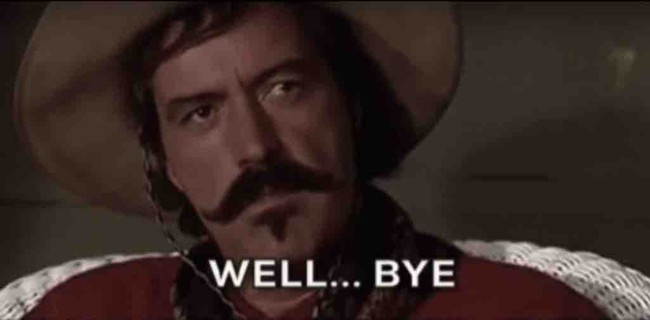0 Commentarios
0 Acciones
94 Views

Directorio
Elevate your Sngine platform to new levels with plugins from YubNub Digital Media!
-
Please log in to like, share and comment!
-
 YUBNUB.NEWSThe Anti-Semitic Jerk Terrorizing Bethany Mandel's Family Got Booted from Fidelity with Extreme PrejudiceA couple of days ago, we told you about Bethany Mandel's terror when she was watching a live feed of a special event from her child's camp, but the feed was cut abruptly when para-gliders floated over0 Commentarios 0 Acciones 95 Views
YUBNUB.NEWSThe Anti-Semitic Jerk Terrorizing Bethany Mandel's Family Got Booted from Fidelity with Extreme PrejudiceA couple of days ago, we told you about Bethany Mandel's terror when she was watching a live feed of a special event from her child's camp, but the feed was cut abruptly when para-gliders floated over0 Commentarios 0 Acciones 95 Views -
 YUBNUB.NEWSParents Play Immigration Roulette for 20 Years, Left Uses Their Kid to Tug HeartstringsWhen one hears the word 'temporary', one might think that means for a very short time. Temporary is generally a few months or maybe a year, but there is always the idea it will end as soon as possible.0 Commentarios 0 Acciones 96 Views
YUBNUB.NEWSParents Play Immigration Roulette for 20 Years, Left Uses Their Kid to Tug HeartstringsWhen one hears the word 'temporary', one might think that means for a very short time. Temporary is generally a few months or maybe a year, but there is always the idea it will end as soon as possible.0 Commentarios 0 Acciones 96 Views -
 YUBNUB.NEWSNearly 174,000 Australian Children Under Nine Now on NDIS, Report FindsApproximately 174,000 Australian children aged under nine are enrolled in the National Disability Insurance Scheme (NDIS), according to the latest quarterly figures.The NDIS Quarterly Report Q4 2024250 Commentarios 0 Acciones 95 Views
YUBNUB.NEWSNearly 174,000 Australian Children Under Nine Now on NDIS, Report FindsApproximately 174,000 Australian children aged under nine are enrolled in the National Disability Insurance Scheme (NDIS), according to the latest quarterly figures.The NDIS Quarterly Report Q4 2024250 Commentarios 0 Acciones 95 Views -
 YUBNUB.NEWSAttack of the PeacemakerFor more A.F. Branco cartoons, go to WesternJournal.com/cartoons.0 Commentarios 0 Acciones 95 Views
YUBNUB.NEWSAttack of the PeacemakerFor more A.F. Branco cartoons, go to WesternJournal.com/cartoons.0 Commentarios 0 Acciones 95 Views -
 YUBNUB.NEWSThey/Them Park Ranger Who Unfurled Trans Flag On El Capitan, Gets a Permanent VacationDo you remember Nate Vince? No one blames you if you dont. He was a locksmith. Until he wasnt. Then, he was again. Vince got fired from his position as Yosemite National Park's one full-time locksmith.0 Commentarios 0 Acciones 94 Views
YUBNUB.NEWSThey/Them Park Ranger Who Unfurled Trans Flag On El Capitan, Gets a Permanent VacationDo you remember Nate Vince? No one blames you if you dont. He was a locksmith. Until he wasnt. Then, he was again. Vince got fired from his position as Yosemite National Park's one full-time locksmith.0 Commentarios 0 Acciones 94 Views -
 YUBNUB.NEWSRookie Isaac TeSlaa Stands Out in Lions CampIsaac TeSlaa #18 of the Detroit Lions on the sidelines after scoring a second-quarter touchdown against the Miami Dolphins in a preseason game at Ford Field in Detroit on Aug. 16, 2025. Gregory Shamus/Getty0 Commentarios 0 Acciones 93 Views
YUBNUB.NEWSRookie Isaac TeSlaa Stands Out in Lions CampIsaac TeSlaa #18 of the Detroit Lions on the sidelines after scoring a second-quarter touchdown against the Miami Dolphins in a preseason game at Ford Field in Detroit on Aug. 16, 2025. Gregory Shamus/Getty0 Commentarios 0 Acciones 93 Views -
 YUBNUB.NEWSChikungunya Outbreak Sparks COVID-Style Controls in ChinaThe chikungunya outbreak continues to spread in China, leading to local authorities applying strict control measures similar to those used during the COVID-19 pandemic.Six provinces and regionsGuangdong,0 Commentarios 0 Acciones 96 Views
YUBNUB.NEWSChikungunya Outbreak Sparks COVID-Style Controls in ChinaThe chikungunya outbreak continues to spread in China, leading to local authorities applying strict control measures similar to those used during the COVID-19 pandemic.Six provinces and regionsGuangdong,0 Commentarios 0 Acciones 96 Views -
 YUBNUB.NEWSChikungunya Outbreak Sparks COVID-Style Controls in ChinaThe chikungunya outbreak continues to spread in China, leading to local authorities applying strict control measures similar to those used during the COVID-19 pandemic.Six provinces and regionsGuangdong,0 Commentarios 0 Acciones 93 Views
YUBNUB.NEWSChikungunya Outbreak Sparks COVID-Style Controls in ChinaThe chikungunya outbreak continues to spread in China, leading to local authorities applying strict control measures similar to those used during the COVID-19 pandemic.Six provinces and regionsGuangdong,0 Commentarios 0 Acciones 93 Views -
New Jersey Officials Investigate Possible First Locally Acquired Malaria Case Since 1991New Jersey Officials Investigate Possible First Locally Acquired Malaria Case Since 1991New Jersey officials are currently investigating the origins of a malaria case in Morris County, after it was found that the person who fell ill had no recent history of international travel.The rest of this article is behind a paywall. Please sign in or subscribe to access the full content.A joint statement...0 Commentarios 0 Acciones 708 Views



